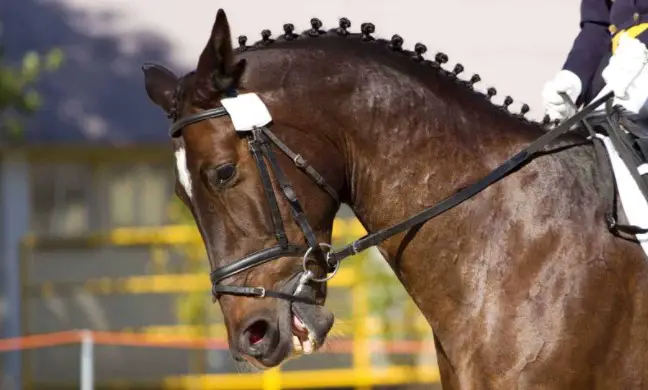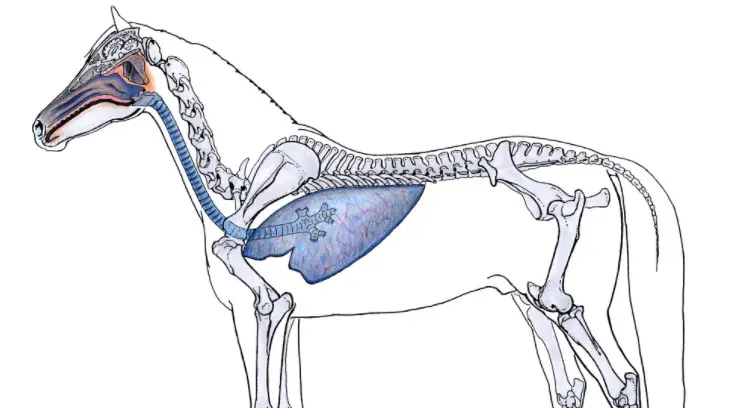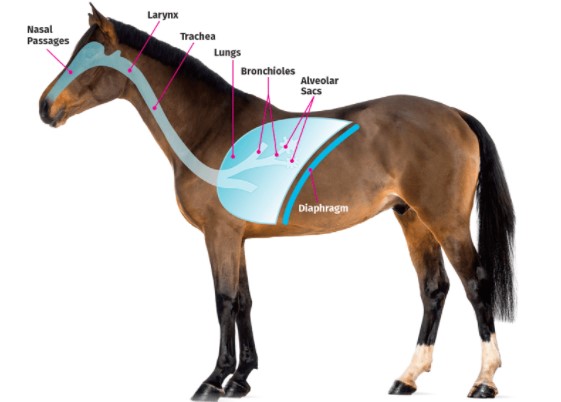Since horses are superior athletically to other mammals, humans have used them for a wide range of activities, including sport and recreational activities.
Horses are endowed with lungs capable of enduring much greater strain since they are mammals developed and adapted for high-energy environments,
Horses also have an excellent respiratory system, which makes them great athletes. However, can horses breathe through their mouths? To know the answer to this question, you first need to understand a horse’s respiratory system.

Horses’ Respiratory System
Horses are obligate nasal breathers, and they only breathe through their nostrils. Due to this, they cannot breathe through their mouth or their nose and mouth at the same time. Therefore, air travels through the nose, nasal passages, nasopharynx, larynx, and trachea during inhalation.

The trachea then divides into two bronchi, which lead to each of the lungs. These bronchi frequently branch within each lung, generating smaller airways called bronchioles. The bronchioles eventually become alveolar sacs. The horse then absorbs oxygen from its bloodstream.
The respiratory system also collects waste gases, then exhales them. In addition, before reaching the lower airways, the inhaled air quickly warms up to body temperature.
The soft palate separates the upper airway above the mouth from the mouth itself. However, horses only breathe using their mouths if they have a soft palate injury or deformity, as well as any pathological conditions.
A horse will flare its nostrils to increase its air intake during exercise. This is to compensate for their inability to breathe through their mouths.
Reasons Why Horses Yawn
If horses only breathe through their nose, why do they yawn? Yawning is an involuntary action that involves opening the mouth and inhaling deeply, filling the lungs with air. Thus, there are several reasons why horses yawn:
- Physical pain
- Gastrointestinal discomfort
- As an action to lower their stress, horses may yawn in a stressful environment
- A social behavior signifying dominance
- Tired horses may occasionally yawn when tired or after resting
Observe the environment if you notice that your hose is yawning more frequently than usual. The horse’s yawn can reveal a lot about its physical and mental condition. It would be best to investigate it as it could signify a much more severe health problem.
Horses’ Lung Capacity
Despite their inability to breathe through their mouths, horses have remarkable lung capacity. With 12 breaths per minute, horses inhale and exhale nearly 60 liters of air per minute. Furthermore, a horse takes in about five liters of air per breath at rest. In comparison, humans inhale approximately 0.5 liters of air with each normal breath at rest.

As a result of such a large lung capacity, the horse’s airflow can increase by as much as 20 times during high-intensity activity. This means that a horse’s respiratory tract may breathe up to 1,200 liters of air every minute during fast work.
The entire respiratory tract must create as little airflow obstruction or turbulence as possible to allow this normal breathing process. Thus, it would be best to avoid any reduction in the airway diameter as this can result in a significant decrease in airflow and, as a result, a decrease in horse performance.
Factors That Affect a Horse’s Lung Capacity
Horses often suffer from respiratory problems as their primary health issues. Consequently, horses need a healthy respiratory system to survive, just like many other animals. However, there are many reasons why horses develop respiratory problems.
A broad range of infectious respiratory diseases caused by bacterial and viral infections, such as strangles and influenza, affect horses of all ages but are particularly prevalent in young horses kept in large groups or yards.
There are also non-infectious respiratory disorders, typically caused by hypersensitivity to environmental allergens. Examples include inflammatory airway diseases, asthma, and hives.
While walking, horses breathe in and out at the same rate. They inhale while suspended as they canter or lop and exhale when they put their first foreleg on the ground. We call this respiratory locomotor coupling. Thus, anything wrong with breathing will affect stride, and anything that affects stride will affect breathing.
A horse’s speed increases by lengthening its stride rather than moving its legs faster at speeds faster than a hand gallop. Additionally, when horses cannot breathe freely, they may become agitated, frightened, or back off. Hence, a reduced airway diameter for your horse means that it must work harder to get oxygen-containing air into its lungs.
If the soft tissue above the nasal passages compresses inward, the nasal passage’s diameter will reduce the horse’s breathing capacity. It usually occurs during training when the horse inhales profoundly and forcefully. Infections, inflammatory, and reactive diseases of the airways can also reduce airway diameter.
Essential Things to Know About Horses
A horse can be in danger when the nostril is blocked since it is primarily a nasal breather. Another dangerous situation can be an allergic reaction or a snake bite. As a result, anything that obstructs the oxygen flow through the nose should be treated as soon as possible before inflammation or fluids become a severe respiratory problem.
Because of these limitations, even a minor irritation or obstruction in the respiratory system can significantly impact performance. This is because horses rely on a massive supply of oxygen to generate the energy needed in their muscles. However, a fit horse inhales and exhales as an unfit horse at a gallop.
Training improves the horse’s muscle and heart performance, but it does not affect its respiratory system’s oxygen capacity. However, the lung does not change. It’s not going to grow or perform better. Any injury to the lungs can result in scar tissue formation and the loss of function.
Conclusion
The respiratory system is crucial in all horses. An excellent respiratory system makes a horse an athlete, but at the same time, it limits their performance. Because of these constraints, even a minor irritation or obstruction in the respiratory system can significantly impact performance.
